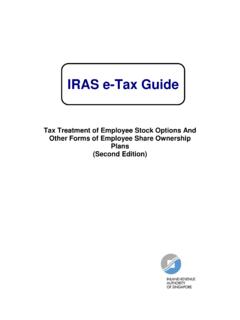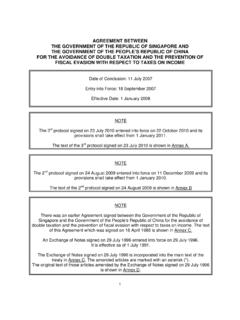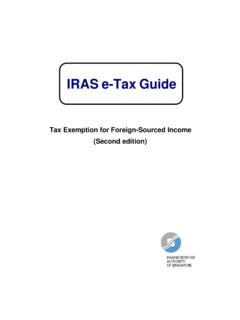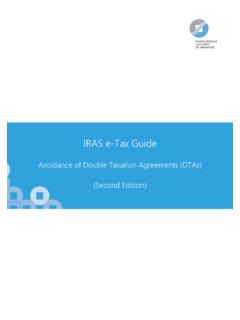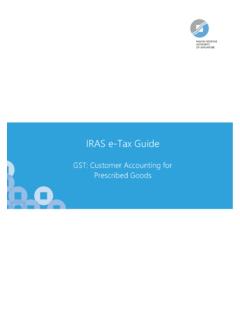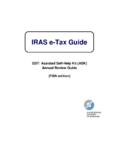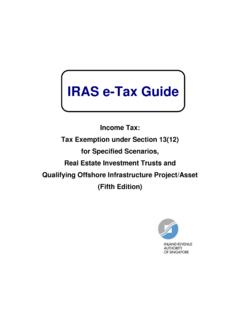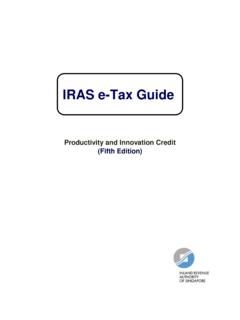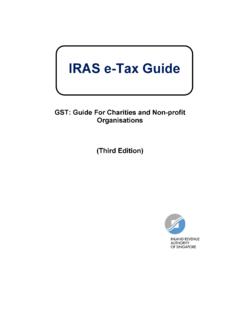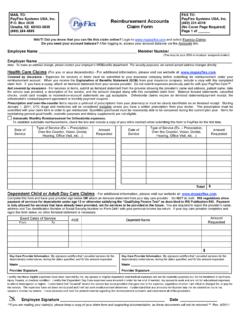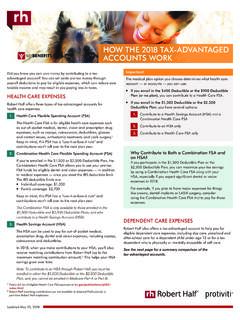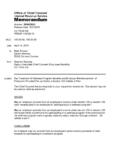Transcription of IRAS e-Tax Guide
1 GST: Guide on reimbursement and Disbursement of Expenses iras e-Tax Guide GST: Guide on reimbursement and Disbursement of Expenses (Second Edition) GST: Guide on reimbursement and Disbursement of Expenses Published by Inland Revenue Authority of Singapore Published on 9 Feb 2018 First edition on 31 May 2013 Disclaimers: iras shall not be responsible or held accountable in any way for any damage, loss or expense whatsoever, arising directly or indirectly from any inaccuracy or incompleteness in the Contents of this e-Tax Guide , or errors or omissions in the transmission of the Contents. iras shall not be responsible or held accountable in any way for any decision made or action taken by you or any third party in reliance upon the Contents in this e-Tax Guide .
2 This information aims to provide a better general understanding of taxpayers tax obligations and is not intended to comprehensively address all possible tax issues that may arise. While every effort has been made to ensure that this information is consistent with existing law and practice, should there be any changes, iras reserves the right to vary its position accordingly. Inland Revenue Authority of Singapore All rights reserved. No part of this publication may be reproduced or transmitted in any form or by any means, including photocopying and recording without the written permission of the copyright holder, application for which should be addressed to the publisher. Such written permission must also be obtained before any part of this publication is stored in a retrieval system of any nature.
3 GST: Guide on reimbursement and Disbursement of Expenses Table of Contents Page 1 Aim .. 1 2 At a glance .. 1 3 Differentiating reimbursement and disbursement .. 2 4 Examples differentiating between reimbursement and disbursement .. 3 5 Overview of GST treatment for reimbursement .. 6 6 Recovery of expenses amounting to a supply .. 8 7 Concession on claiming input tax on disallowed expenses which are subsequently recovered .. 19 8 Billing for recovery of expenses .. 25 9 Frequently asked questions .. 27 10 Contact Information .. 29 11 Updates and Amendments .. 30 Annex 1 - Flowchart on GST treatment for recovery of expenses .. 31 Annex 2 Summary of examples .. 32 GST: Guide on reimbursement and Disbursement of Expenses 1 1 Aim This e-Tax Guide is relevant to all GST-registered businesses that incur expenses and subsequently recover the expenses from another party such as their employees, customers, related corporations or suppliers.
4 It provides clarification on the following: a) The GST principles for differentiating between a reimbursement and disbursement; b) The GST treatment for reimbursement of expenses; and c) The concession on claiming of input tax on disallowed expenses where such expenses are recovered from another business. It also illustrates the application of these principles on some common business examples. 2 At a glance The GST treatment for the recovery of expenses depends on whether the expenses are incurred by you as a principal or an agent ( incurred on behalf of another party). The manner of invoicing alone ( showing such expenses as a separate item on the invoice) is insufficient to determine the GST treatment of these items.
5 For the purpose of GST, the term reimbursement refers to the recovery of an expense that you incur as a principal from another party. On the other hand, the recovery of a payment made on behalf of another party by you as an agent is termed as a disbursement . A disbursement does not constitute a supply and hence, is not subject to GST. A reimbursement , on the other hand, may be subject to GST if it is consideration for a supply of goods or services. The flowchart in Annex 1 gives an overview of the GST treatment for the recovery of expenses. Prior to this Guide , a recovery of expense is considered as a separate supply ( reimbursement ) and hence, subject to GST, as long as it does not meet the following conditions for disbursements: Conditions for disbursements The other party is responsible for paying the supplier; The other party knows that the goods or services would be provided by that supplier; The other party authorised you to make the payment on his behalf; The other party is the recipient of the goods or services; The payment is separately itemised when you invoice the other party; You recover only the exact amount paid to the supplier.
6 And GST: Guide on reimbursement and Disbursement of Expenses 2 The goods or services paid for are clearly additional to the supplies you make to the other party. The GST treatment set out in this Guide shall apply to recovery of expenses that occur on or after 31 May 2013. Nevertheless, to give businesses time to adjust to the rules stated in this Guide , businesses may continue to apply the rules stated in paragraph up to 30 June 2013. 3 Differentiating reimbursement and disbursement For any recovery of expenses, you will first have to establish whether the recovery is a reimbursement or disbursement. To determine this, you should look at whether you have acted as a principal or agent in purchasing the goods or services and incurring the expenses in the first place.
7 If you incur the expenses as a principal If you pay the expenses as an agent The recovery of expenses is a reimbursement a disbursement GST treatment The recovery of the expenses from another party may amount to a supply and may be subject to GST or exempt from GST, as the case may be. The recovery of expenses does not constitute a supply and hence will not be subject to GST. Input tax claim You are entitled to claim input tax incurred on goods or services procured by you if the subsequent recovery of such expenses constitutes a taxable supply. You are not entitled to any input tax claim since the goods or services are not supplied to you but to your principal.
8 Generally, you are acting as a principal in procuring the goods or services if you contract with the supplier in your own name or capacity. In the event that the contractual relationship is not clear, the following set of indicators can be used as a Guide to establish if you are acting as a principal or agent in procuring the goods or services. You should apply all the indicators objectively, where applicable, to your transaction. You do not need to satisfy all the indicators, however, based on the indicators applicable to your transaction, you should determine on balance whether they point towards you acting as a principal or agent. GST: Guide on reimbursement and Disbursement of Expenses 3 Indicators You are a principal if You are an agent if Contractual liability and assumption of responsibilities and risks You have contracted for the supply of goods or services in your own name or capacity.
9 You have arranged for the supply of goods or services on behalf of another party and you are not a party to the contract. Legal obligations to make payment/ payment arrangement You have the legal obligation to make payment for the goods or services. For example, the third party supplier s tax invoice is issued in your name. You do not have the legal obligation to pay for the goods or services but is authorised by another party to make payment to the third party supplier on his behalf. For example, the third party supplier s tax invoice is issued in the other party s name. Alteration to the nature and value of supplies You can alter the nature or value of the supplies and make decision on the value of expense to recover.
10 Unless authorised to do so by the other party, you cannot alter the nature or value of supplies made between the other party and the third party supplier. Identities of parties and transaction involved You are the only party known to the third party supplier; and The third party supplier knows the identity of the other party; and The other party does not know the cost incurred by you on the purchase of goods or services from the third party supplier. The other party knows the exact cost incurred by you on the purchase of goods or services from the third party supplier. Ownership of goods (If the recovery relates to goods) You own the goods.

